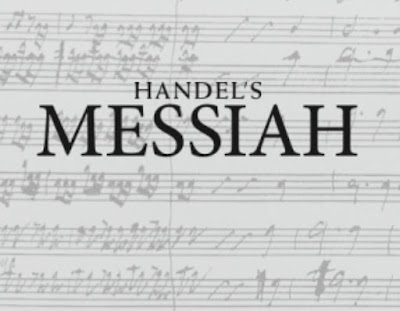Tuesday, December 21, 2021
Handel's Messiah
His father tried to discourage his musical interests, preferring that he enter the legal profession, but it was the organ, harpsichord, and violin that captured the heart of young George Frideric Handel.
Soon, this remarkable child, born on February 23, 1685, began composing operas, first in Italy then in London. By his 20’s, he was the talk of England and the best paid composer on earth. Londoners fought for seats at his every performance, and his fame soared around the world.
But all too soon the glory passed. Audiences dwindled. His music became outdated. One project after another failed, and Handel, now bankrupt, grew depressed. The stress brought on a case of paralysis that crippled some of his fingers.
“Handel's great days are over, his inspiration is exhausted, wrote Frederick the Great.
But his troubles also matured him, softened his sharp tongue, his temper mellowed, and his music became more heartfelt. One morning he received a manuscript form Charles Jennens, from the King James Bible, and from the Coverdale Psalter, the version of the Psalms included with the Book of Common Prayer.It was a word for word collection of various Biblical texts about Christ. The opening words from Isaiah 40 moved Handel:
“Comfort ye, comfort ye my people…”
On August 22, 1741 he shut the door of his London home and started composing music for the words. Twenty-three days later "The Messiah" was born!
“Whether I was in the body or out of the body when I wrote it, I know not,” Handel later said.
The Messiah opened in London to enormous crowds on 23rd of March 1743, with Handel leading from his harpsichord. King George II surprised everyone leaping to his feet during the Hallelujah Chorus. The audience followed suit. Nobody knows why his majesty jumped to his feet. Some believe the king, being hard of hearing, might have thought it was the national anthem.
Whatever the case, from that day on audiences everywhere have stood in reverence during the words: “Hallelujah! For He shall reign forever and ever!”
Handel’s fame was rekindled, and even after he lost his eyesight, he continued playing the organ for performances of his oratorios until his death on April 14, 1759.
King of kings, forever and ever!
And Lord of lords, Hallelujah! Hallelujah!
And He shall reign forever and ever!
Hallelujah!
Hallelujah!
Hallelujah!
Hallelujah!
Subscribe to:
Post Comments (Atom)
Miracle in a Small Town
Many times I have driven through Monticello, Kentucky on Christmas morning on the way to my parents house. The quiet streets and the stillne...
-
The Roanoke Colony was an enterprise financed and organized by Sir Walter Raleigh in the late 16th century to establish a permanent English ...
-
When I think of the 70's, I think of the greatest rock and roll music ever. It is now included in a music genre that is known today a...



No comments:
Post a Comment